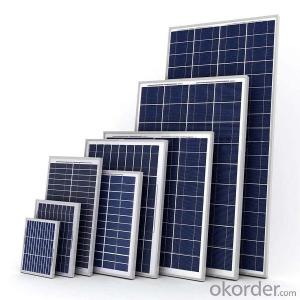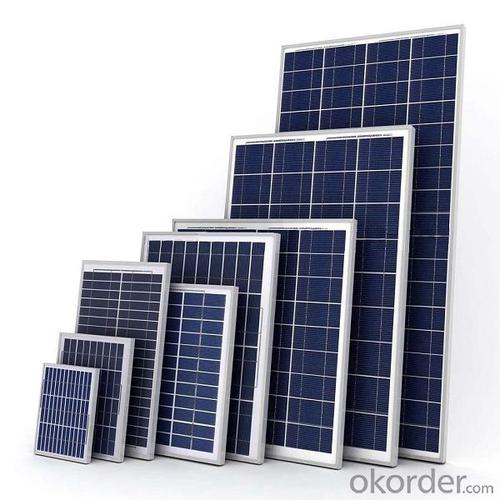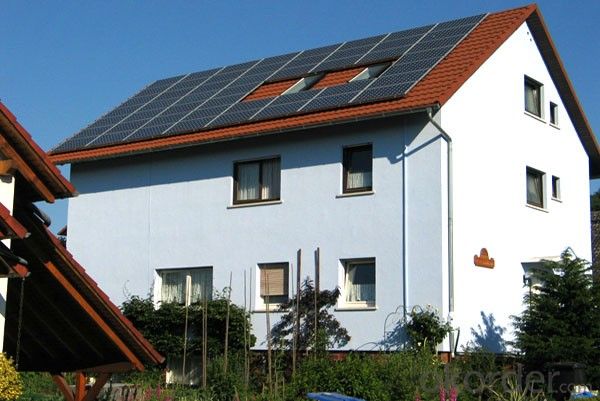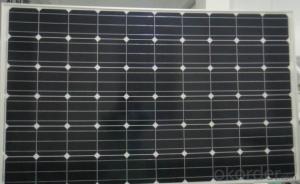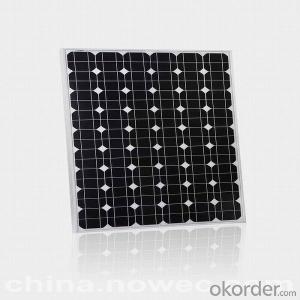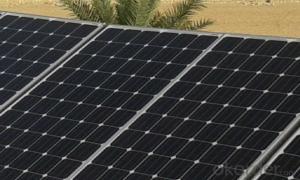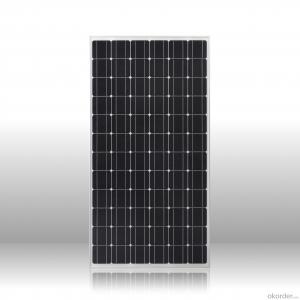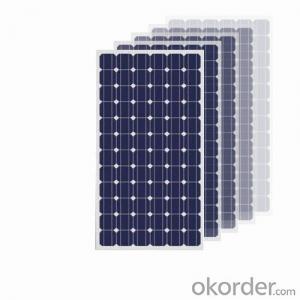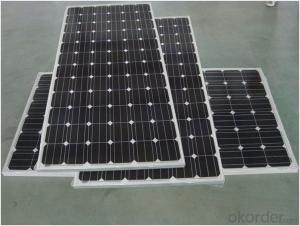Aep 50w Mono Solar Panel - High Efficiency Solar Panel
- Loading Port:
- Shanghai
- Payment Terms:
- TT OR LC
- Min Order Qty:
- 10 watt
- Supply Capability:
- 10000 watt/month
OKorder Service Pledge
OKorder Financial Service
You Might Also Like
Specification
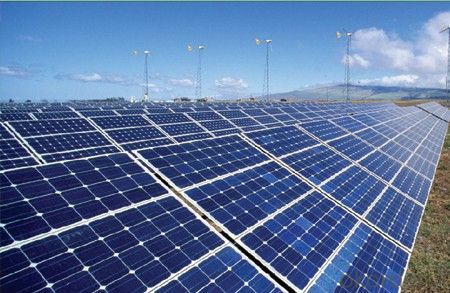
Quality Ensurance:
1. Excellent A Grade solar cell from Suntech or Hanwha solar.
2. Excellent backsheet from SFC, 3M;
3. EVA from Bridgestone / First;
4. Junction box with UL and TUV listed - GZX, IP65;
5. High transmission low iron tempered glass from Xinyi Glass - China Top 1;
6. Solar panels with TUV, CE, ISO9001 certified.
Strong, lightweight aluminum frame design with reinforced sealing and load hold to prevent freezing and warping, and stand against high wind.
Under Standard Test Conditions(STC): Irradiance of 1000W/m2, Am1.5 and 25º C cell temperature
Operating Temperature: -40 ~ +85° C
Storage Temperature: -40 ~ +85° C
Mechanical Characteristics
Dimensions: 732mm(L) x551mm(W) x 30mm(H)
Weight: 5.3kg
Solar Cells: Monocrystalline 125*125 solar cells, 36 cells in a 4x9matrix connected in series
Module Warranty:
25-year limited warranty of 80% power output; 10-year limited warranty of 90% power output; 5-year limited warranty of materials and workmanship.
| Performance | ||
| Rated Power[Pmax] | 50W | |
| Power Tolerance | ± 3% | |
| Nominal Voltage | 18.86V | |
| Design Life | 25 years | |
| Electrical Characteristics | ||
| Maximum Power [Pmax] | 50W± 3% | |
| Maximum Power Voltage [Vmp] | 18.86V± 3% | |
| Maximum Power Current [Imp] | 2.66A± 3% | |
| Short-Circuit Current [Isc] | 2.92A± 3% | |
| Open-Circuit Voltage [Voc] | 22.54V± 3% | |
| Current Temperature Coefficient | 0.031%/º C | |
| Voltage Temperature Coefficient | - 0.31%/º C | |
| Power Temperature Coefficient | -0.42%/º C | |
| Maximum System Voltage | 1000V | |
- Q: I am interested in installing a home solar panel system. In my city, we get a little over 5 hours of sun, and I typically use about 800-900 kwh per month.The available roof space is small- approximately 600 sqft.The online calculators provided on various sites are not uniform, thus providing inconsistent responses with the same input data.I think I need a 5kw system approximately. Can anyone verify that and provide a link for a reasonably priced system to meet my needs? Prefer grid-tied, but off-grid is acceptable as well.Thanks!
- And at what tilt? Are there trees, poles, or buildings that cast a shadow on the roof at any time? Is the space clear of vent pipes (these can be moved, but it's extra work and cost)? Probably your best move is to contact a solar installer, and get a free quote on a system. Have them quote a system that you own, not a lease. They will do an analysis of your home, which will be very valuable even if you decide not to use a professional. If there are no professional installers in your area, that's an indication that your area may not be good for solar.
- Q: Can solar panels be installed on a retirement home or assisted living facility?
- Yes, solar panels can be installed on a retirement home or assisted living facility. In fact, many retirement homes and assisted living facilities are recognizing the benefits of solar energy, such as reduced energy costs and environmental sustainability, and are choosing to install solar panels on their buildings.
- Q: Do solar panels require cleaning?
- Yes, solar panels do require cleaning to maintain their efficiency. Dust, dirt, bird droppings, and other debris can accumulate on the surface of the panels, blocking sunlight and reducing their ability to generate electricity. Regular cleaning helps ensure optimal performance and maximizes the energy output of solar panels.
- Q: Can solar panels be installed on a prison or correctional facility?
- Yes, solar panels can be installed on a prison or correctional facility.
- Q: I want to get a solar panel to run a fan (or two) for swamp coolers.I'm not looking to power 20box fans, just maybe some of those auto fans.What the heck kind of panel do I need? What is a power inverter and what does it do?Will I lose all my power if I use a 00' extension cord?How do I choose what I'm going to need?
- Solar panels turn sunlight into direct current electricity usually at 2, 24, or 36v. You could probably have a very simple system with just a panel and a few dc fans assuming that: the panels never put out more power than the fans can handle, you don't mind the fans slowing and stopping when the sunlight fades. If you want the fans running more of the time, you will need the panel hooked to a charger that charges a car/marine type battery and the fans connected to the battery. The longer the wires, the thicker they need to be (and more expensive). If you want to use AC (alternating current like your house uses) you will need an inverter (which turns DC into AC). Each device and each section of wire loses power due to inefficiency (heat produced). Contact a solar company on line, in person, or learn more.
- Q: Can solar panels be installed on water bodies or reservoirs?
- Yes, solar panels can be installed on water bodies or reservoirs. This is known as a floating solar power plant or floating photovoltaic system. It involves placing solar panels on floating platforms that are anchored to the bottom of the water body or reservoir. This innovative approach allows for the utilization of otherwise unused space, reduces evaporation, and provides cooling benefits to the solar panels, increasing their efficiency.
- Q: Can solar panels be installed on tall buildings?
- Yes, solar panels can be installed on tall buildings. In fact, tall buildings are often ideal for solar panel installations as they typically have more available roof space to accommodate a larger number of panels. Additionally, being elevated, tall buildings are less likely to be obstructed by shading from surrounding structures or trees, maximizing their exposure to sunlight and optimizing energy generation.
- Q: Does anyone own any and would you recommend them? right now i only own solar stake lights and i use them during the summer in my yard. But during the winter i take them out because they don't charge well. I live in toronto canada where it snows a lot during the winter, would it even be worth it to buy solar panels? Would they get covered with snow if the were mounted on my roof and get ruined? I plan on buying some when i purchase my own home.Any info would be appreciated:)
- The best sort of solar panel for $ to energy is the hot water type that use a vacuum tube system to heat your water. This saves you money on heating water and is relatively cheap to install compared to other things like wind or PV solar. I'm not too sure about where you live (I'm in the westcountry of the UK where wind energy IS viable... but usually it isn't). The best sort of Photo voltaic solar panel (that makes electricity)is still expensive yet very reliable as they only need photons to fall on them not neccessarily full sunshine and they are improving all the time. It depends on the pitch of your roof as to whether snow settles on them. One can have a system that sells power back to the national grid and then you buy what you need with a discount for what you produce. Obviously if you can afford enough panels one could even make a profit. Or you can go self-sufficient, but then you need batteries and an inverter to convert your 2 volt battery output back to 20 volts or whatever you use (it's 240 volts in the UK). Then it's a matter of how efficient your batteries are in amp hours. Dry mainainence free deep cycle batteries are best for this job and quite expensive still. Wind generators are only really practical if you can mount them high enough from the ground to where there is more constant wind. As I said that depends where you live and the prevailing winds. The very small ones are basically useless except for emergency lighting or something, so one needs a fairly large turbine to produce enough power for a modern home so planning restrictions should be considered when going down this road. For now, solar power is definitely the way to go, even as far North on this planet as Canada and the UK. Good luck. Once you have the system it's basically FREE energy!
- Q: how to market solar energy products?
- It depends upon your product. If it is a solar panel, I want to know if it is a photovoltaic panel or a thermal panel. If you don't know enough to know the difference for your question it might be somewhat difficult to suggest others should buy them. Products have to be marketed to a need either already felt or not so apparent. Photovoltaic panels supply an electric need and will offset electrical usage or may supply the grid if there is excess power. A discussion of payback periods including property values will be needed in any event. Thermal panels supply heat and hot water. They are more efficient than photovoltaic panels and will give faster payback times. (are cheaper) If you are a bit more specific more information may be possible.
- Q: Okay, so I have a science fair coming up soon and I need help with my project. SO - What should I use to demonstrate with the propeller? A toy boat? Plane? And I only have mini solar panels ; so how do I put the solar panels on the toy boat/plane to make the propeller move off of the sun's energy? Thanks. Steps please!
- Solar panels produce electricity. To move the propeller you need mechanical motion. An Electric motor converts from electrical to mechanical power. Most Solar Panels produce DC electricity as do batteries so you need a DC motor that is sized to match the Output of your solar panels. For small temporary projects like this I find that hot melt glue is great to assemble parts. Using a voltage meter you can expose your solar panels to a strong light (or one equal to what you expect during your demonstration) and measure the voltage across the terminals. This may help to size the motor. It depends upon the size of your propeller and how it is made. Your three choices are to use it to power an airplane, to power a boat underwater or to power a boat like an air boat. You might also use the air boat concept to make a car. (air car) The air boat might be the simplest to make but you will need a body of water to demonstrate the concept. The air car doesn't have such a requirement.
Send your message to us
Aep 50w Mono Solar Panel - High Efficiency Solar Panel
- Loading Port:
- Shanghai
- Payment Terms:
- TT OR LC
- Min Order Qty:
- 10 watt
- Supply Capability:
- 10000 watt/month
OKorder Service Pledge
OKorder Financial Service
Similar products
Hot products
Hot Searches
